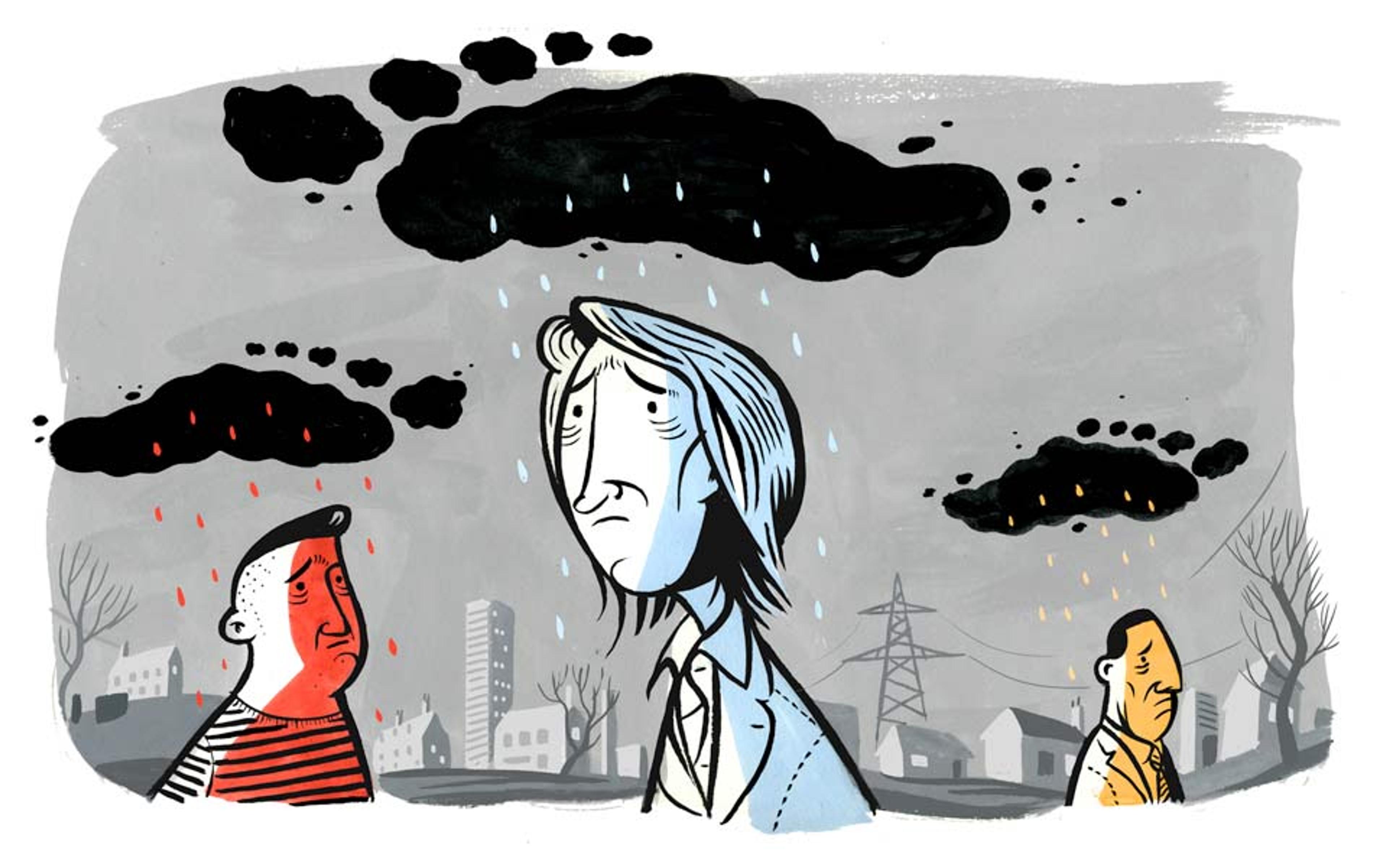One fine day in 2015, near where I lived in Norwich, I was delivering leaflets for the Green Party, noticing on my way the deathly state of the gardens in the area – this one, scattered with rubbish; this one, manicured to death with weedkiller; this one, and the next, paved over for cars; this one, with a dead fridge standing forlorn on the grass – when these words flashed into my head, unbidden:
‘This civilisation is finished.’
For some time afterwards, I was in a state of shock. But, being a wannabe public intellectual, after a few weeks, I did what any half-decent intellectual would… I started writing about it. The piece I wrote, I considered at first too incendiary to publish. When friends and colleagues persuaded me to go ahead, saying that this was the kind of authentic writing they’d never encountered from me before, I was unwilling to do so under my own name. At length, for the first time ever, I published under a pseudonym. After remarkably supportive feedback, I started giving talks with the title ‘This Civilisation Is Finished’. It seemed that people loved the breath of fresh air: someone was calling it.
But there was still something missing. I didn’t have a plan. I could see no way for humanity to avoid collapse without rapidly transforming this civilisation into something very different. So what do you actually do about that?
During the three years after my epiphany, I had found that my words on the topic were achieving some resonance. Yet, lacking anything much like a plan, I still felt directionless, unsatisfied, even at times nearly hopeless. That all changed when I heard about an embryonic organisation that was seeking to gear up to launch: Extinction Rebellion (XR). Their analysis was similar to mine; some of their leaders had heard or read some of my stuff. But there was one big difference: they had a plan.
I threw myself into XR. Helped them launch. Became a strategist and spokesperson, as well as running their political liaison efforts. After the successful April 2019 rebellion forced a national conversation, I was part of the team that met with Michael Gove, then environment secretary, and other members of the UK’s Conservative government. Through May 2019, the plan had worked.
XR accomplished something extraordinary, unprecedented. I’ll never regret being part of that. Finding XR, after finding my own voice, was finding a life’s purpose.
The Canning Town debacle planted the seed in my mind and that of a number of others that perhaps XR was not capable of being the vehicle for mass-participatory change. It started a process of reassessment. By September 2020, like a number of others who had played significant roles in XR, I felt it was time to move on. It seemed that XR had likely achieved most of what it was capable of: a major uptick in climate consciousness; finally cutting through climate denial in the name of a renewed moral seriousness. Over the next year, I entered a new phase of thought. Asking how to name the emergence, already underway, of a much wider and larger, more ‘moderate’ more-than-movement, to rise to the challenge of the escalating more-than-emergency.
Participation in and positive impact of XR reached a ceiling in October 2019. This was partly because XR hit a self-imposed landmine in the infamous Canning Town action, which involved a small, extreme group of activists making the incomprehensible choice to target an underground commuter train in a low-income area of London for nonviolent direct action. XR had transformed climate consciousness in the UK and, with the aid of the school climate strikers, in much of the world. But it had not succeeded in changing policy. And now perhaps it never would.
Malm holds that the gravity of the situation requires property damage, such as severing oil pipelines
So the question re-arose: what would, what should be the plan, under these circumstances? Throughout the period of and in which I am writing, the level of peril the world faces has steadily risen. When XR launched, we called for rich countries like the UK to go carbon zero in an emergency programme of change by 2025. On such a short timeline, every passing year is a big increment, putting such goals ever further out of reach. Now in 2024, recordbreaking escalation in temperature places us firmly outside our self-declared ‘safe’ zone; and, obviously, achieving carbon zero by 2025 is completely impossible. And I argue that staying below 1.5°C of global over-heat is plainly impossible too. Until that awareness sinks in and rocket-fuels us, we’ll never stop the rot.
As a citizen waking up to this terrible truth, as the situation becomes more and more desperate, does the obligation to take desperate measures – in terms of the tactics we’re prepared to undertake, not just the policies we’re looking to bring about – increase? That can seem very intuitive. XR thought so. Insulate Britain agreed – as did Just Stop Oil (JSO): these smaller organisations were formed explicitly as radical flanks to XR. Some, notably the Swedish ecologist Andreas Malm, take the matter further still, into ‘ecotage’: Malm holds that the gravity of the situation requires substantial property damage, such as severing oil pipelines. I have debated the merits and otherwise of such an approach directly with him; I shan’t discuss it further here, but will instead focus on whether large-scale nonviolent civil disobedience of the XR and JSO kind is obligated upon us by the escalating crisis.
The classic philosophical debate around civil disobedience (or nonviolent direct action) asks: is there a right to engage in this form of conscientious law-breaking, under circumstances of deep wrong, where conventional methods of addressing that wrong have failed or are unavailable? It’s widely accepted among philosophers that there is such a right: it is virtually unknown for philosophers to argue against it; even an extremely mainstream liberal individualist such as John Rawls argues for it. And the climate crisis fits the bill for the exercise of this right. Because it is a case of a huge and urgent injustice – a threat to the very viability of ongoing human civilisation, an existential risk – where conventional methods have been tried and failed, and moreover where vulnerable unborn future generations are not able to stick up (let alone vote) for themselves to try to redress the matter.
So there is no need to rehearse that debate. It is basically settled: there is a right to engage in civil disobedience in our current extreme circumstances. That, however, does not settle the matter of whether one should engage in such organised disobedience.
For there is a more interesting, more timely debate emerging in recent years: are there circumstances and contexts in which (every)one has an obligation to participate in civil disobedience? This question goes far beyond the ‘Is it acceptable?’ debate. Former colleagues of mine in XR (now in Just Stop Oil) sometimes argue passionately that we are in precisely such a condition: that you, reader, are morally obligated to join them. I want to consider that case.
I perceive two inseparable elements to the standard case for an obligation to participate in nonviolent civil disobedience, or (as it is often called) ‘civil resistance’: moral and pragmatic. The moral element says that this is simply the right thing to do – to be ‘on the right side of history’, whatever the consequences; and to signal one’s ‘solidarity’ with those worst affected; with the younger generation; with unborn future generations. In technical terms, following the great moral philosopher Immanuel Kant: what is to be done is allegedly deontologically or intrinsically determinable. It is allegedly a universal obligation to seek to head off an unprecedented catastrophe, by any acceptable (usually, nonviolent) means necessary. The idea is that, with the conventional political process having failed to put us on the path to a future indicated by science, precaution and ethics, we are obliged to take matters into our own hands by stepping outside the law in order to ‘just stop oil’.
The first thing to say about any alleged solidaristic obligatory moral case for backing the radical flank is that now, in countries like the UK, it is hard to square with what young people actually want. Consider the 2023 YouGov poll asking the public their opinion of JSO, the campaign group behind the now-dominant form of ‘civil resistance’ in the UK. Only 17 per cent of adults have some kind of positive opinion of what JSO are doing. Among 18- to 24-year-olds, the figure is higher but not much: 21 per cent have a positive view. Across all ages, hugely larger percentages have a negative view: 10 times as many have a ‘very unfavourable’ view as have a ‘very favourable’ view of JSO. Among young people, the ratio is ‘only’ four times as many.
Because a small minority of young people rather than a tiny one (of older people) supports Just Stop Oil plainly does not mean you can show solidarity with the demographic by supporting JSO.
Making a hoped-for outcome probable is a minimum threshold for a collective endeavour to make sense
But, regardless of what young people happen to want, it might be argued that it’s simply the right thing to do to undertake civil resistance on their part. Paternalistic, perhaps, but still right, possibly. Nevertheless, any such case will be very weak by itself. To be convincing, it needs coupling with the pragmatic case: that the action undertaken is likely to actually be the best available way to bring about the desired outcome that will protect young people. And this has been widely understood: the standard pragmatic case for civil resistance, based on social movement theory and indeed history, is that it is simply the most effective way to bring about transformative change.
The weakness of a moral case alone to support an obligation to nonviolent direct action is therefore clear. Outside a relatively narrow category of intrinsically right or wrong actions, we commonly identify the morality of actions – especially, any costly and strenuous actions in the public sphere – with a hoped-for outcome. Or at least: making a hoped-for outcome probable is a minimum threshold for a collective endeavour to make sense.
Consider the person who chooses, on a ‘purely’ moral basis, what they admit is likely the less effective of two possible actions to change climate policy. The logical response of a young person is surely to reject the ‘morality’ of this action: Damn your ‘solidarity’; I want a future! So kindly do what is effective.
Any philosophical assessment of an alleged obligation to undertake nonviolent direct action that hopes to be relevant to the real world must therefore consider likely consequences. It cannot avoid assessing whether there may be a more effective alternative course of action.
Now don’t get me wrong. I am not offering a simple get-out clause. Not at all. I do hold that we – each and every human not fast asleep – are obliged to take action on this existential crisis. Let me explain.
When we are failed by our leaders, when the system fails, this does not absolve us from responsibility. On the contrary. Everything is now at stake. If you care about anything at all, then ipso facto, whether you know it or not, you care about the climate crisis. For we are on track to have it sweep away all that we hold dear. If you care about the arts, or about disability rights, or about your own children, then you care about this: for they will all, on a default setting, get swept away by the ‘white swan’ threat of climate meltdown. So you must, at minimum, consider what you can do to change this situation, to avert or cope with this mother-of-all-threats hanging over us now. To put the matter in terms that the existentialists would have understood: all your projects are mortally threatened by this existential threat, this hyperthreat. So you must, among all your projects (and, in a certain sense, prior to them), consider this project.
You are obliged to consider your position. You are obliged to discover what is your most effective potential work to do, to contribute to there being a future.
The vast majority of ‘doomism’ turns out to be grasping for a reprieve from having to act, from committing
Feeling small and relatively powerless does not absolve you. So long as you have any power or voice whatsoever, you are obliged to use it (and grow it). You are not absolved by speculating that we might be doomed. You don’t know that we are and, until you do, such speculations are beside the point. (Doomism is a prime instance of the undue ‘knowingness’ characteristic of our flawed civilisational model: the tendency to assume that we know something that is, in fact, imponderable.) Similarly, you are not absolved by wondering if it is perhaps ‘too late’. This widespread phrase is tellingly vague. One should always ask in response: Too late for what? Yes, it is way too late for a smooth ‘net zero’ transition, or for us to be able to stay in the climatic ‘safe’ zone. It is too late, as I set out earlier, for this civilisation to continue to exist! But it is not too late to co-create a new one (or at least: you do not know that it is); it is not too late to transform and adapt; and it is never too late to seek do the right thing in the place you find yourself.
The vast majority of ‘doomism’ turns out to be what Jean-Paul Sartre called the grasping for a reprieve. A reprieve from having to act, a reprieve from committing. Those who reached for the excuse, during the Second World War, in (say) occupied France, that there was nothing they could do, that resistance was futile, that they were only obeying orders, we now judge to have been in bad faith, or at least to have been seriously mistaken. A similar judgment waits to hang over those who are primarily motivated to find excuses not to act in the face of the climate more-than-emergency (which threatens to end up killing far more than Hitler did). Our children will reject such excuses, and they will, where appropriate, make such judgments.
I suggest therefore that everyone under the current unprecedented circumstances (of a collectively imposed existential ‘hyperthreat’ that is more or less tractable, but that conventional methods have largely failed to affect) is indeed obliged to act in a serious manner to deal with that threat. We are obliged by our situation to try to change our direction of travel, together: in simple terms, to change the world. But I pull back from the conclusion that we are obliged to undertake ‘civil resistance’, for the simple but crucial reason that our obligation must be understood as an obligation to undertake the most effective intervention possible in our circumstances. No obligation to engage in civil resistance exists where there is good reason to believe that other available interventions are more effective.
Let me now take a moment to consider a specific case where I think this good reason is visible. It’s the case I know best: my own country. ‘Civil resistance’ in the UK has met the limits of its effectiveness since 2019 and is now merely symbolic. The actions of Insulate Britain (IB), primarily blocking motorways, were very probably (and predictably) counterproductive. That is why IB has disappeared. Just Stop Oil, learning from IB’s mistakes, did not necessarily start out that way, but is now very much suffering from the law of diminishing returns, with citizens growing tired of attention-grabbing and disruption to the general public. With the UK government bringing in repressive laws that are, tragically, popular, JSO has surely become counterproductive too. This view is widely held in the environmental movement now, as well as beyond it. (It is not often stated, for reasons of ‘solidarity’.)
JSO has lost the war. It has not stopped oil; instead, the UK government doubled down on oil production; moreover, the Labour Party has said it will not undo new fossil fuel licences being issued en masse by the Conservative government.
Not only has XR changed its strategy, as of December 2022, and moved away from public disruption, recognising it as counterproductive, but, this January, even Roger Hallam, XR’s co-founder and the doyen of the ‘more radical than thou’ flank, made a startling admission: ‘We were pushing up against a boulder called “the carbon regime”. Now, like Sisyphus, I see that we were doomed to watch it roll back in our faces.’
So even he now allows for something like the mass, serious, moderate action that I am advocating for here.
What’s needed is depolarisation (whereas civil resistance inevitably polarises)
If one goes back to social movement theory and examines the pragmatic case for nonviolent civil resistance, one finds that it is typically made against violent resistance. Very good. But it virtually never considers the potentially viable alternative of a concerted programme of lawful moderate action at scale. In particular, whether such a programme may be doubly effective after some partly successful nonviolent direct action has been undertaken to force a national conversation. This is precisely the situation that the UK (and some other countries) have been in since 2019. With XR and Fridays For Future having succeeded in raising the alarm in 2019, the door is finally open for something that has never happened before: a more-or-less-concerted and yet distributed, truly mass, mainstream, climate more-than-movement.
The intuitive argument that ‘Desperate times require desperate tactical measures’ is therefore, I now believe, invalid. The truth may well be the opposite, paradoxical though it might sound. In times when the weather is our greatest recruiter, and when evermore people are looking for ways to come on board, what’s needed is the opposite of seeking to be more ‘radical’ than thou. What’s needed is mainstreaming of climate action (without losing any focus on the difficult, terrible truth of our climate predicament). What’s needed is depolarisation (whereas civil resistance inevitably polarises). What’s needed is to be genuinely welcoming to the majority, who are sidling towards coming on board, but who will be easily put off if they’re made to feel insufficiently righteous or ‘radical’. What we don’t need is a false sense of moral obligation to undertake civil resistance, whether or not it is likely to work. No: we need ways to figure out together the (effective) work that is ours to do – and do it.
What this looks like will vary, depending on exactly what are your passions, talents, capacity. There is something for everyone to do in the great work before us; but there is no ‘wholesale’ answer to the question of what it consists of. The question needs tackling person by person – which is not the same as making it a matter of individualist action. There is, for sure, no non-collectivist way of adequately tackling our condition; but our tasks will vary as much as our talents, experiences and resources.
However, any reader breathing a sigh of relief at this conclusion – which might seem to let us ‘off the hook’ in relation to (allegedly) having to break the law – should not bask too long in the feeling. The obligation remains upon us all to do what is most effective, within the totality of our powers, along with others, to help bring about profound change. And for the vast majority of people this means not necessarily becoming an ‘activist’ but becoming collectively active in ways that will alter their priorities substantively and substantially. Nothing less will allow us to look our children in the eye, and answer the only question that, sooner or later, they will ask: What did you do, once you knew?
You probably have to change your life.
Again, I don’t mean that you have to give up flying or eat less meat. By all means, do these things, and they will help a little bit (I’ve done both, though as much to avoid tiresome criticism that distracts from my voice being heard without tiresome accusations of ‘Hypocrite!’, as for their own sake). Alas, I mean something much weightier than that. You need to reassess what you are actually doing with your life as a whole. Because what you do needs to scale, or to replicate or be replicable, or at least to cause a win in some zone that matters. It needs, in short, to help add up to something system-transformative. To be part of co-creating that new civilisation.
The Climate Majority Project that I co-founded after leaving XR asks everyone to consider a question: what is your work to do? How can you be most effective in the shared struggle for a future? If you are rich, it is probably by throwing your money into the ring (and thus, in due course, becoming not-rich). If you are a lawyer, there are multiple ways you can parlay your skill into the cause. If you are in business, the raft of things that you ought to do starts with lobbying hard for government more effectively to regulate the business world, to reward ecologically sound behaviour and end the race-to-the-bottom that competitive markets otherwise create. For many people, the work will be to get seriously involved in climate-preparedness, in resilience-building in your community, as best you can. The beauty of such preparedness-building is not only its practical value, but its tendency to wake up others to the crisis.
It may well be that the most effective thing you need to do right now is stop, and really think and feel it
For teachers and academics, it is about teaching and researching the crisis, and communicating it lovingly and truthfully, supportively and efficaciously. For creatives, the way forward is somewhat similar: put your talents into helping imagine how we can get through this. Until we can see a path through what is coming, we are unlikely to get serious enough about building it. For those in politics and policy, or in the media, it doesn’t take much imagination to see how you might actually respond courageously and effectually to the crisis, and lead on it. For advertisers and people in PR, it’s about putting your ‘dark arts’ into the service of bringing about some light at the end of the tunnel.
For anyone unsure of how best to contribute to the struggle for a future, it may well be that the most effective thing you need to do right now is stop, really think and feel it, talk it through, and thus spend some time figuring out your best role. Especially (though not only) if you are a young person, it may well be that the most effective thing you can do right now is to seek out a few people who are modelling leadership on the crisis, people who you think are acting particularly effectively, and volunteer your services to them; I mean, figure out how they could use some volunteer assistance, and how you could provide it to them in your free time. The huge advantage of this course of action is that you will gain some mentoring, which is often the most effective way of figuring out what your own best contribution can be, longer term.
There’s something for everyone under the #climatemajority banner. For some, the change will be extremely drastic: if you’re are an oil exec, then your best options include defecting, or becoming a double agent or a whistleblower. For many, ‘changing your life’ will look surprisingly like continuing to do what you do – only doing it differently. Using your talents, your resources, probably your position, to the maximum effect, in the shared cause.
We now have a fully shared and fully personal (again, one might call it ‘existential’) obligation to act on behalf of life.
You have to mean it.
Returning finally to me. I’ve quit academia, something I never quite did during my XR years, to focus full-time on building, supporting and deepening the climate majority. I am deeper embedded than ever in my life’s purpose. I feel more directionful than I can say. It’s great (or it would be, if the cause wasn’t that the world is burning).
I’ve gone all-in, even more than XR pulled me in. I’m feeling fully and fertilely the obligation to act on the side of life.
And so must we all, at a time like this. That has been my argument. There is a place for everyone, in the climate majority. But you must find (or make) that place. And enter it. Fully.
My own story might serve you, perhaps: as one example of how someone can change their life, heading deeper into what they do best, and living it.
Becoming as maximally effective as we can be, in a mainstreamable manner, in a situation where, unless many, many of us do that, then all civilisation will be finished, is the only way to escape what some in the radical flank claim is your obligation: to enter into civil resistance.
If you are thinking of undertaking disruptive action, please think it right through
For to be clear: I believe that not just conventional activism but determined nonviolent direct action, up to and including ecotage (that takes care not to harm living beings), is likely the most effective way for some people to act. I still think it was the right thing to rebel back in 2018-19. And it is still the right thing for some to do right now. For example, most of Scientist Rebellion’s feisty and formidable, ongoing, nonviolent, carefully targeted civil disobedience appears potentially effective, without backfiring, and (therefore) worthwhile. That is the key: assessing whether a course of action is smart, and maximally pragmatically effective – or not. (Putting themselves on the line is generally effective for SR because of the respect in which scientists are held, and their direct relevance to the crisis: they are, after all, its principal diagnosers. Our society now needs prompting into concerted action more than we need endless further diagnosis. And scientists express that point well by visibly and forcefully protesting!)
But first: do no harm. If you are thinking of undertaking disruptive action, please think it right through.
If you are not thinking of undertaking disruptive action, that’s absolutely fine… provided you are thinking actively of the changed form of your life going forward that is liable to be most effective of all. More effective, at minimum, than such disruption might be.
This is perhaps even the new ramifying categorical imperative, one that includes a binding consequentialist consideration nested within it… Act in the universal interest: of life, of a future. Act after thinking through the consequences: so as to be effective in the universal interest. But do be sure to act. To the full.
You won’t regret it.
Rupert Read’s new book The Climate Majority Project (2024) is co-edited with Rosie Bell and Liam Kavanagh. Thanks to them – and also to Vlad Vexler and Nigel Warburton – for fabulous comments on earlier versions of this piece.






